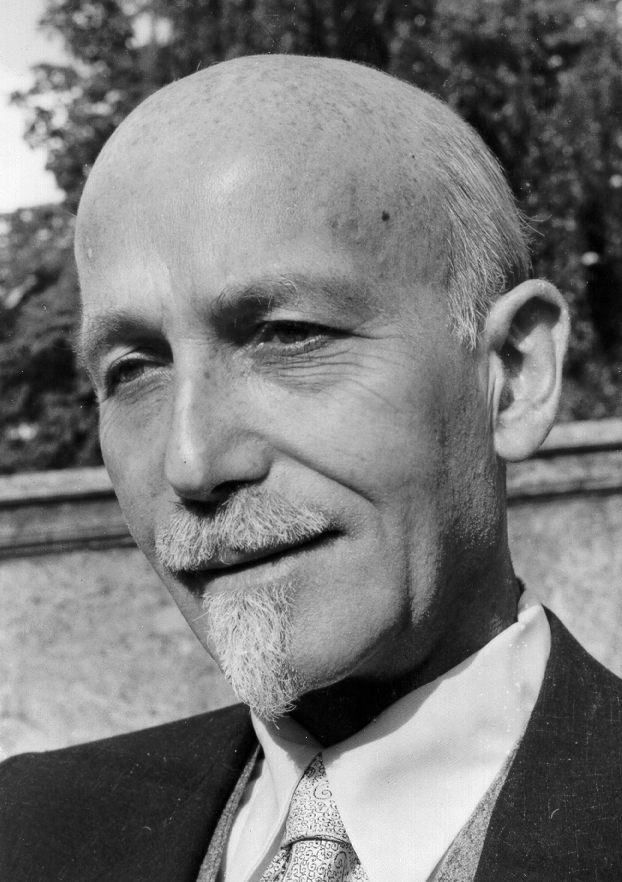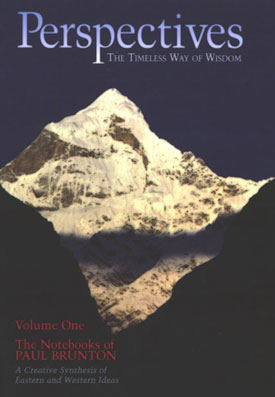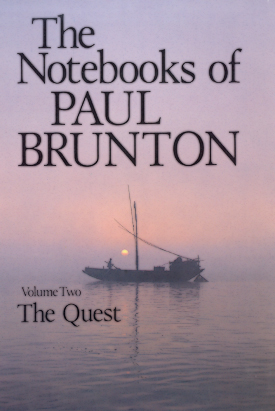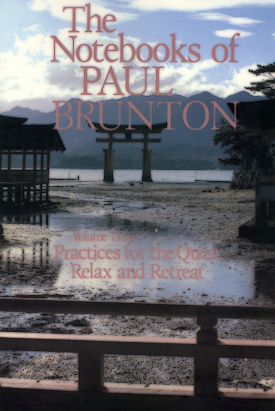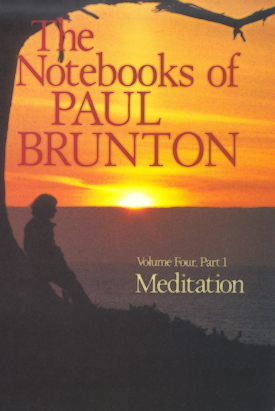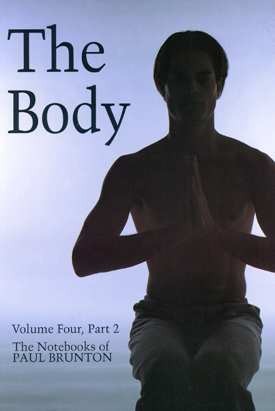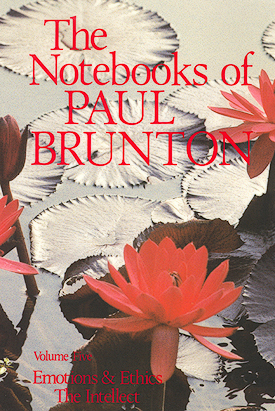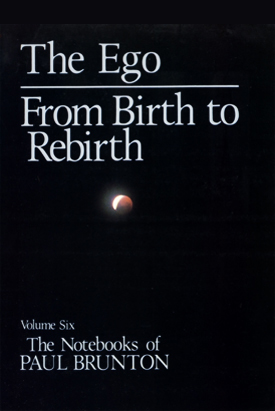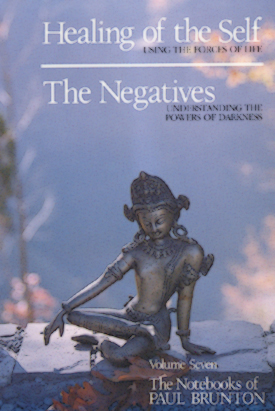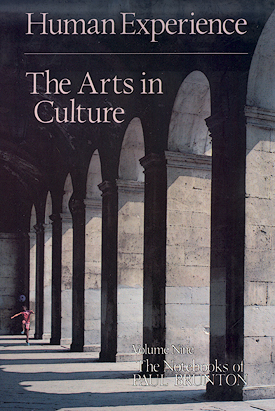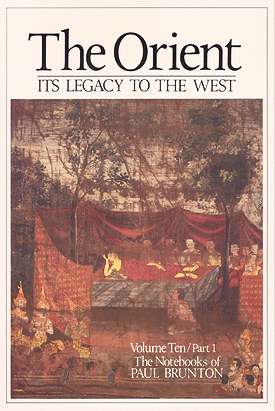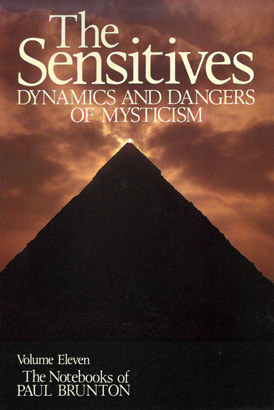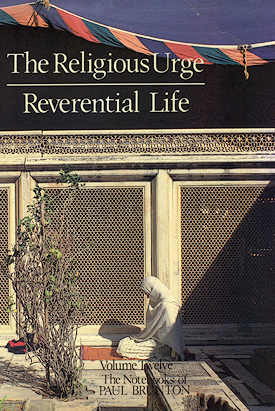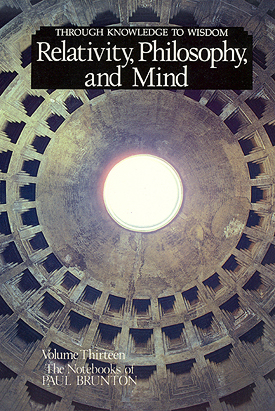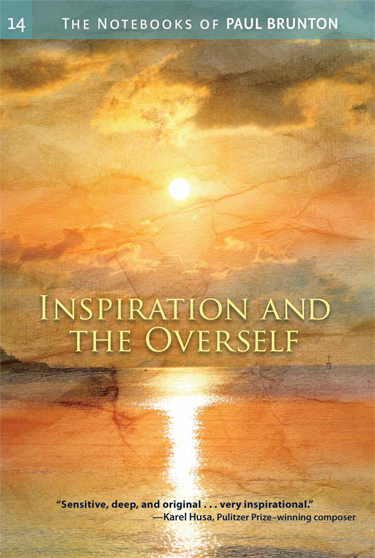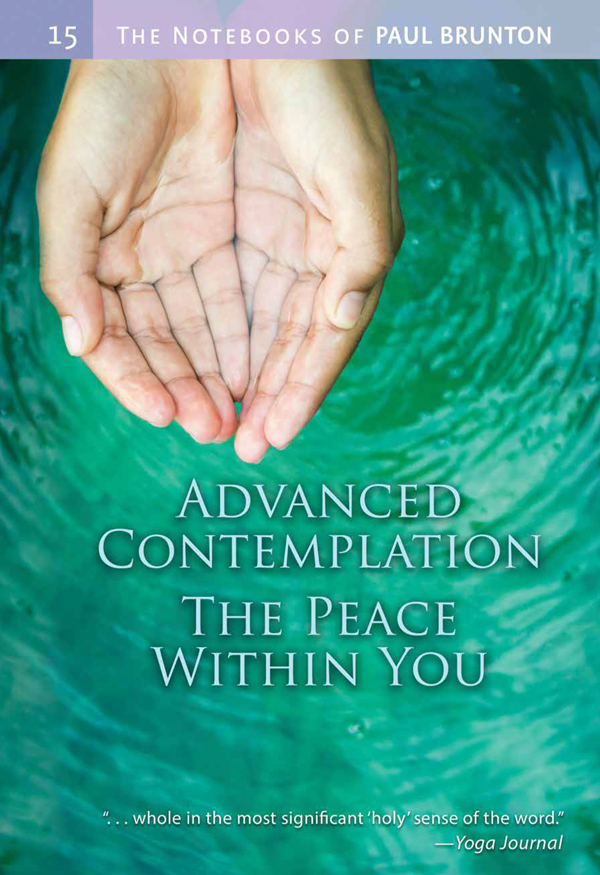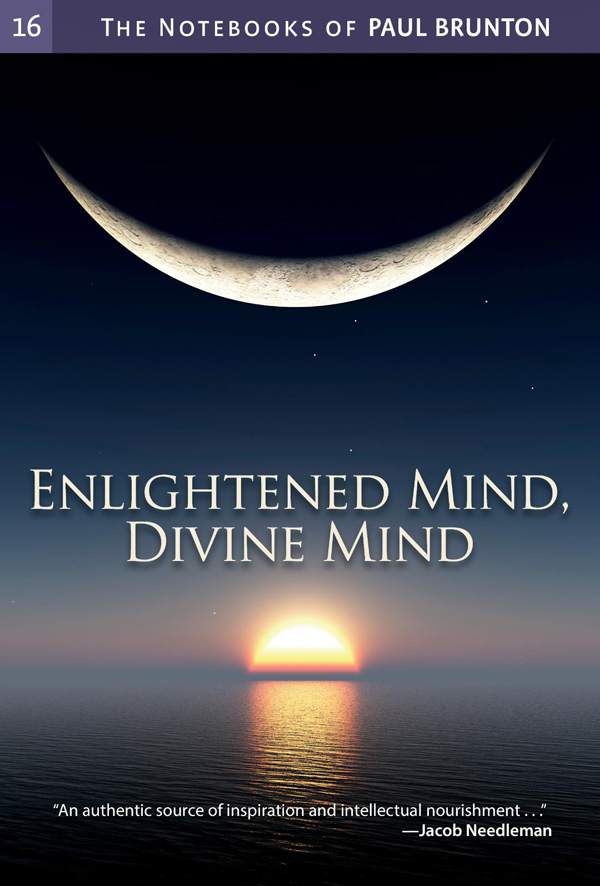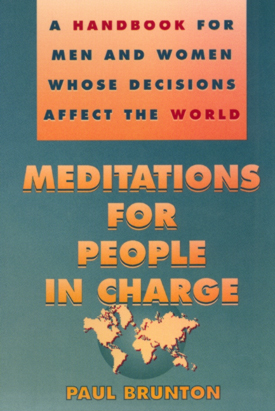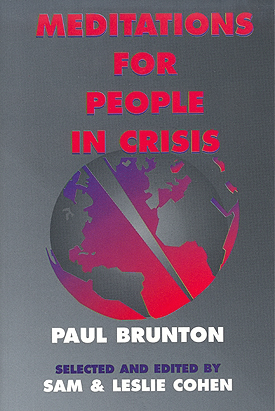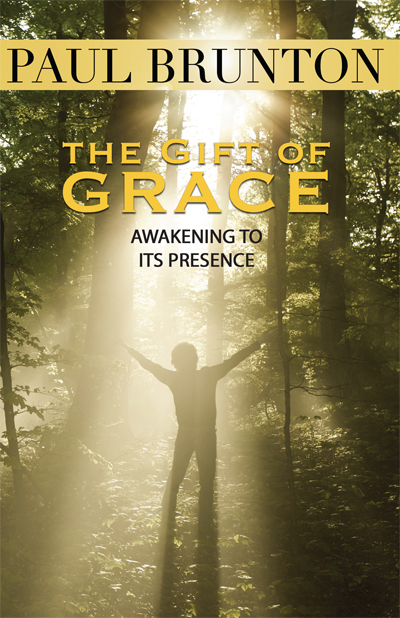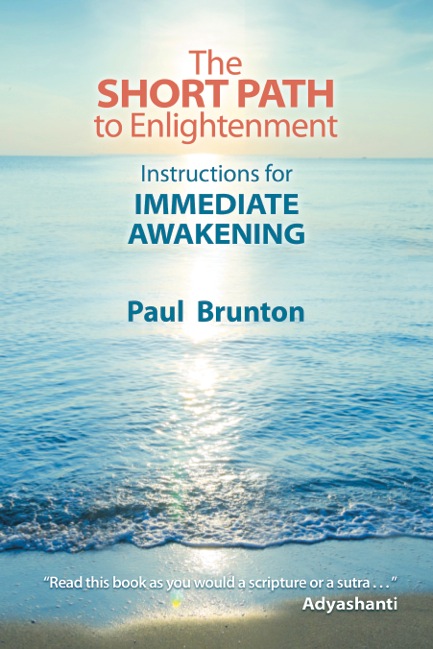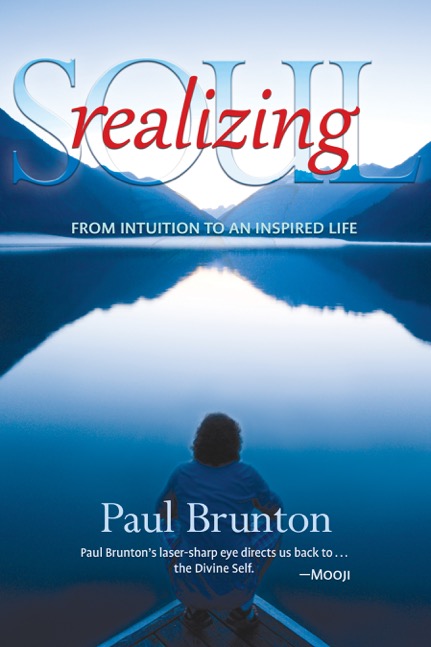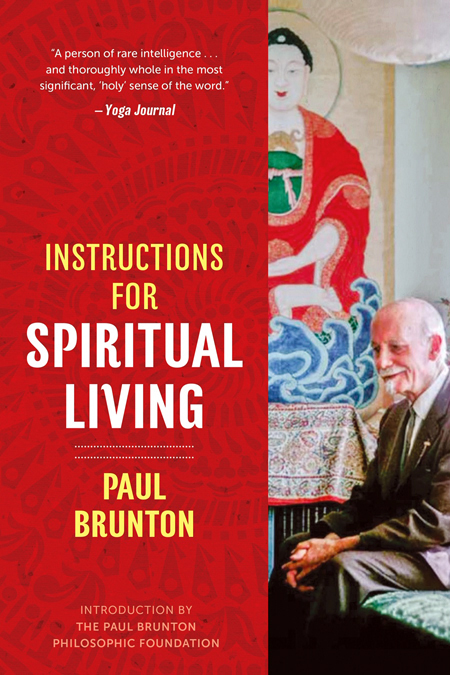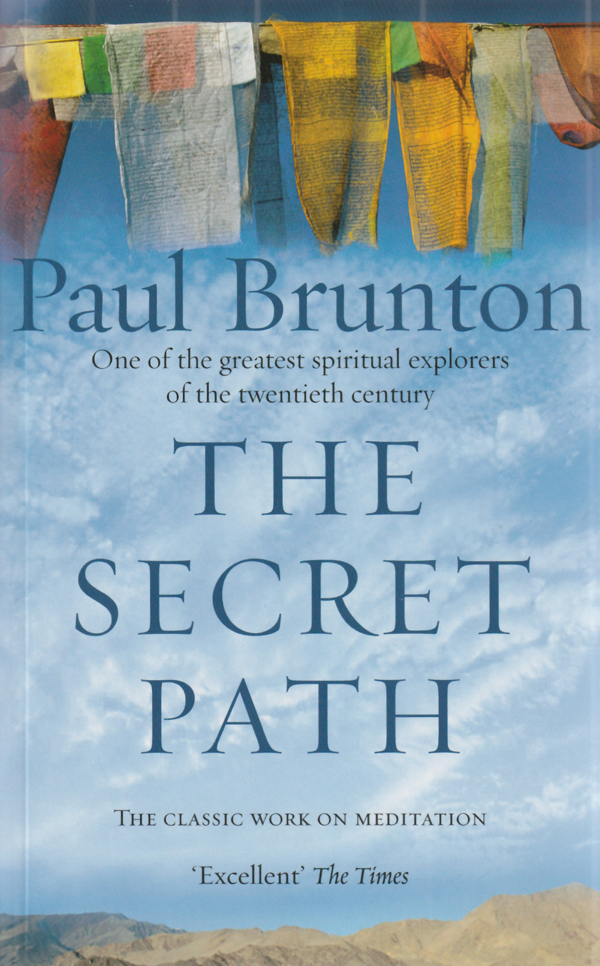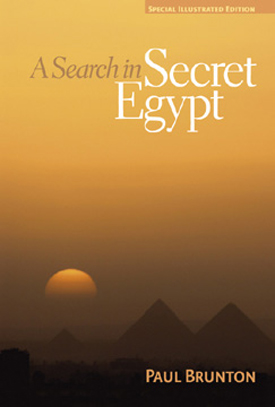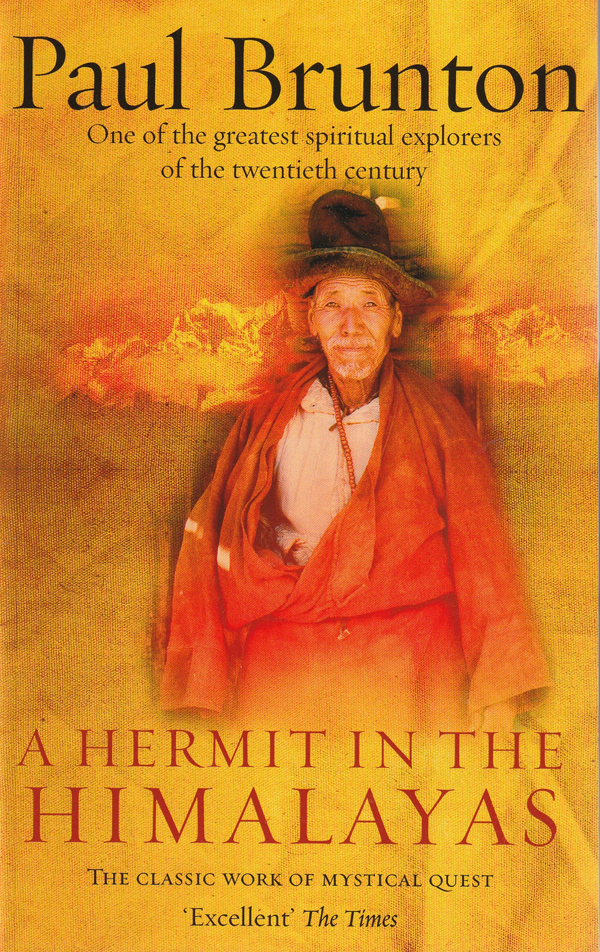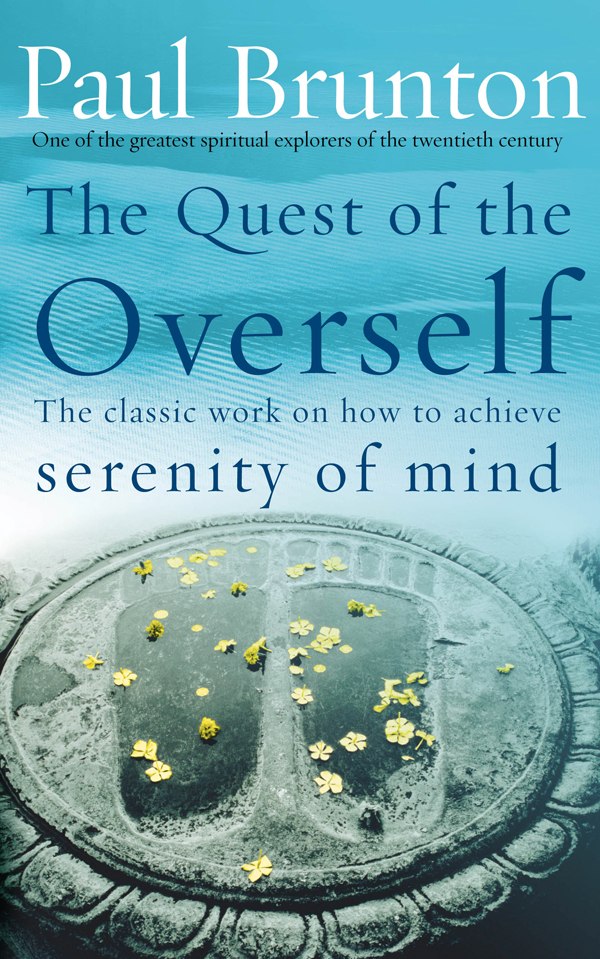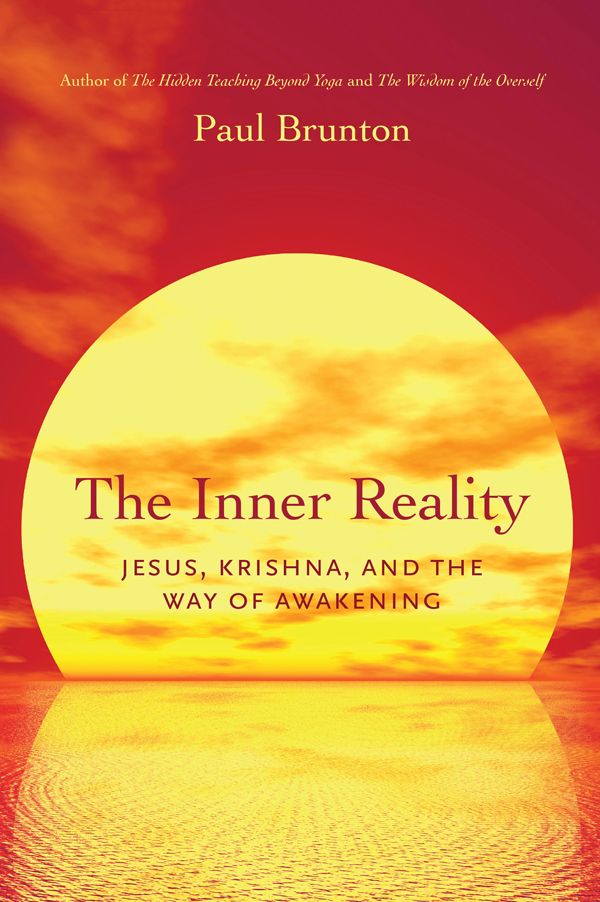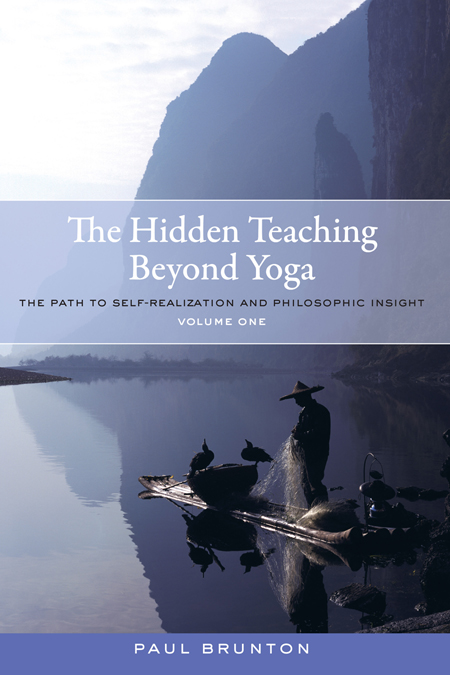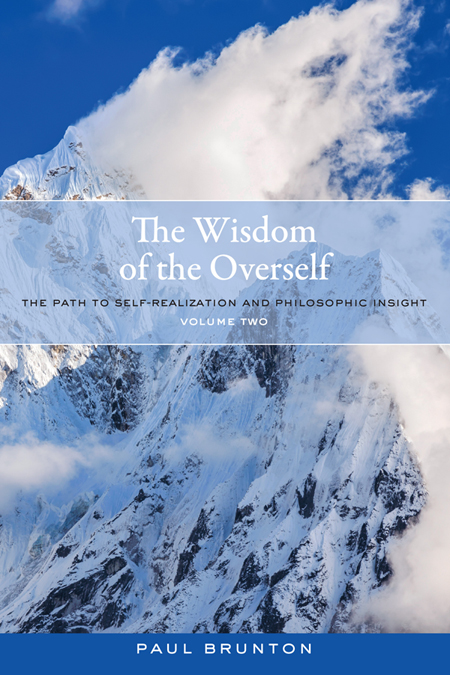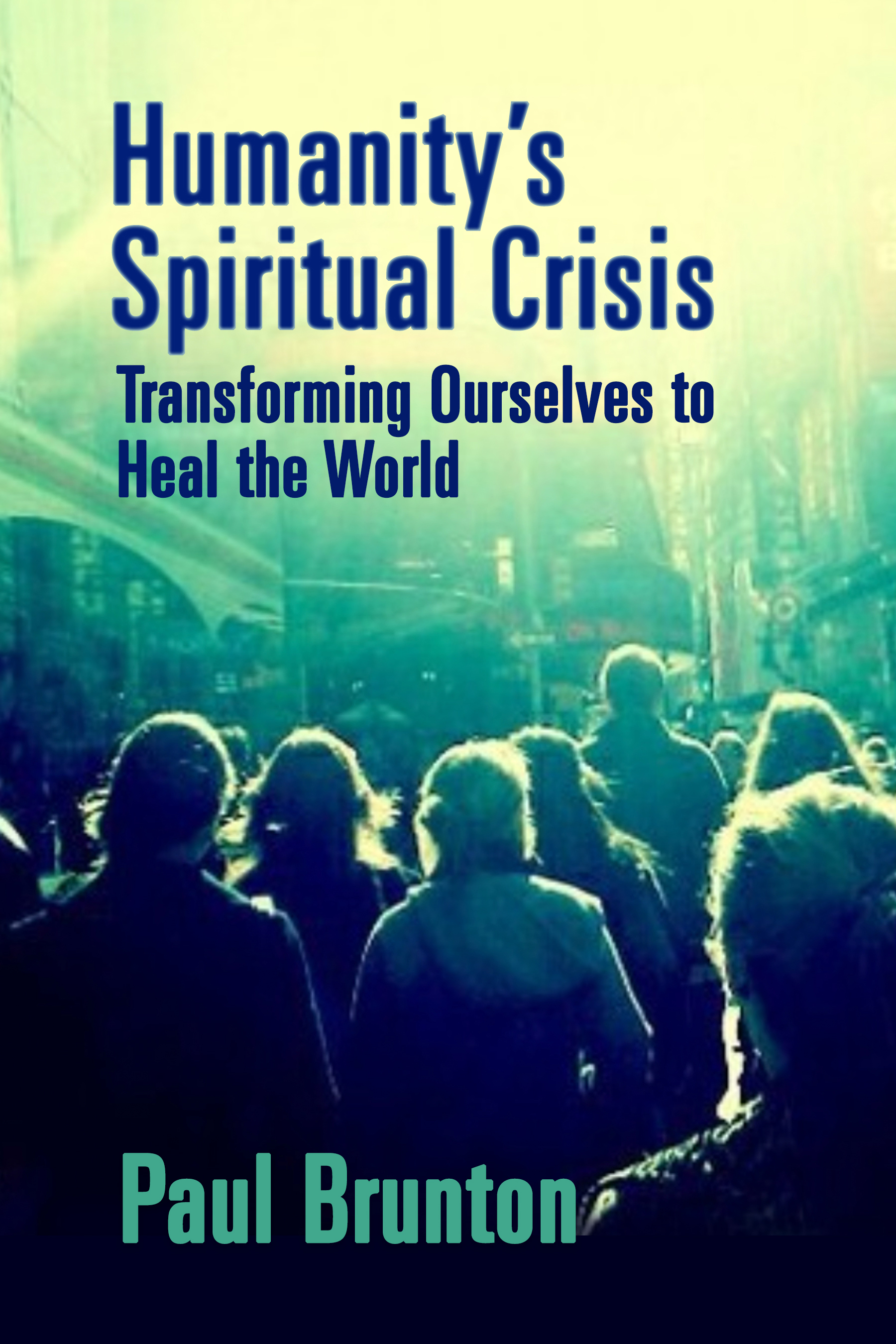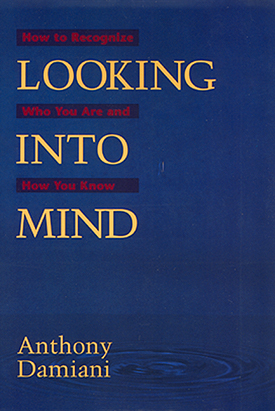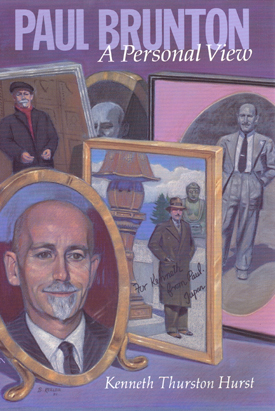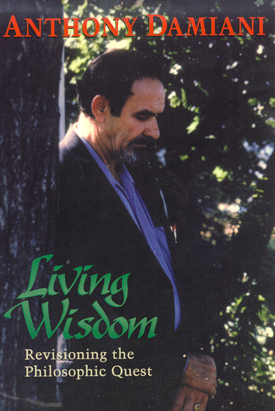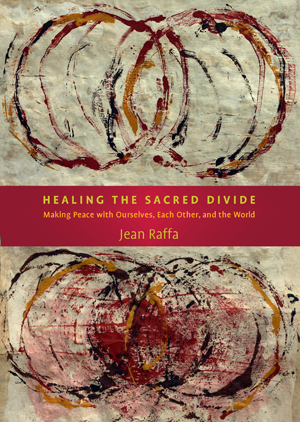What Is Karma?
(original edition) By Paul Brunton

Retail/cover price: $10.95
Our price : $8.76
(You save $2.19!)
About this book:
What Is Karma?
(original edition)
by Paul Brunton
More than 40,000 U.S. prison inmates have personally requested this refreshing, positive view of karma, its relation to forgiveness, freedom, and enlightenment, and how to get it working for you, as part of a special program sponsored by PBPF.
Subjects: Spirituality, Self-Development
5 x 7.5
144 pages
ISBN 10: 0-943914-87-6
ISBN 13: 978-0-943914-87-9
Book Details
"Karma." A household word by now. But how many of us actually know what it means? Here is a refreshing, positive view of karma, from one of our most perceptive students of how timeless wisdom enhances modern living:
• What karma is
• How it works
• Its relation to forgiveness, freedom, and enlightenment
• How to get it working for you
More than 40,000 U.S. prison inmates have requested this book through a project operated by the Paul Brunton Philosophic Foundation. Many write moving letters of appreciation about how it is changing their whole take on how life works and what’s possible.
Introduction
1 What Karma Is
2 How Karma Works
Karma and inner evolution
Learning by doing
Freedom, fate, destiny
Freedom and environment
Group karma
Karma and foreknowledge
Timing, cycles, intensity
Individual accountability
3 Karma and Grace
The wonder of grace
Recognizing grace
Invoking grace
4 Working with Karma
Apply your understanding
Counter harmful tendencies
Accept, endure, overcome
5 Karma and the Great Liberation
Beyond personal karma
Selected excerpts from thank-you letters written by incarcerated men and women who have received this book:
“What is Karma was the most inspiring book I have read in a long, long time — it made me feel alive once again.” —prisoner, Avenal, CA
“What is Karma? . . . is one of the most insightful and on time books of my life. . . . I shall pass along the knowledge to others (believe this) and let them know of your very charitable organization.” —prisoner, AZ
"I have been told about What is Karma? by a friend I met here. . . He told me he was a lot like me. He was very angry, unforgiving, and just did not care. . . . He said he loves the book and he has been talking to a lot of men here . . . —prisoner, Sonyea, NY
"Recently, my girlfriend and I were introduced to a few passages from your book What is Karma? I can’t describe how the wisdom was so to the point. As young women addressing life's adversities, it’s a blessing to receive altruistic, knowledge, wisdom and direction.” —prisoner, Baltimore, MD
“When I first wrote to you I was seeking knowledge on how I could overcome my desire for using drugs. . . . I now see the problem I had from a different perspective, and because of this I now have a renewed faith in myself and humanity.” —prisoner, California Corr. Inst.
“Thank you very much for the books. . . . I have never read anything like them that has opened my mind, my heart and also my soul as much as they have. I wish that Mr. Brunton was still with us today so that I could thank him personally for all the insight. But he’ll live on forever within my mind now . . . —prisoner, Dinwiddie, VA
"I started smiling and have not stopped yet! My struggling mind was immediately quieted. . . . I thank you from my very core and I wish that you may feel the peace that your gift gave me. P.S. I will keep this book always as a guide and also as a reminder of how powerful karma truly is.” —prisoner, Fairfax, SC
". . . I’m hoping that you can please send me a copy of the karma book. A friend tells me he has changed his way of thinking because of this book and I would like to study whatever he was looking at.” —prisoner, Beeville, TX
“What is Karma? is very inspiring. Each day I read a saving proverb or thought for the day and believe me my brothers I receive great strength. I need that strength cause I’m here in Texas working on a small corner of their Plantation that they pride themselves on by treating other humans like dogs.” —prisoner, Rosharon, TX
"I received What is Karma? a couple of weeks ago and have read it through more than 7 times. I had to because it was very deep. I don‘t want to make this too long but I felt compelled to write you and extend my appreciation. Thank you very much.” —prisoner, Draper, UT
"Karma."
A household word by now. Often spoken with whimsy or heard with scorn in intelligent circles. Especially by energetic self-actualizers, who associate it with passivity or hear it as an excuse for laziness or fear of responsibility. Sometimes sighed in real or affected resignation to "God's will."
Imagine my surprise to learn that karma is, in fact, all about self-actualizing. About power and results. That to think of it as a power external to myself is to misunderstand it completely. That to explore how it works is to expand the scope and explore the limits of self-actualization.
Each of us has inner power and a measure of freedom, these teachings say. The consequences of how we choose to use — or choose not to use — that power echo through our lives. The echoes become increasingly complex as life goes on.
Similar choices made again and again become tendencies. Tendencies become habits. Habitual thoughts, habitual emotions, habitual actions take over, color and shape our whole version of the world. We may start thinking that the way things seem to be is the way they really are and have to be. When thinking that way becomes a habit, we can most benefit from understanding the natural law of karma.
The teachings on karma are not about dumbly resigning yourself to things as they seem to be. They're about reawakening to your own power to see more clearly and to act more profoundly and effectively. If I can master the force that creates and alters habits, they tell me, I align myself with the force that creates and transforms the world.
Understanding how karma works doesn't lead to simply enlightened selfishness. It involves much more than just getting savvy about how to become immune from harm and preserve or further your ego's self-interest. Most importantly, and most emphatically, it's not about hiding out — concealing what little you have so things don't get even worse.
Understanding karma takes us out of our inner isolation and beyond issues of pain avoidance and self-preservation. Not only is each of us self-actualizing in the sense of eventually reaping what we sow. The entire universe, we learn from the teachings about karma, is a self-actuating system; its continuous existence and continuous activity depends, like our own, on something infinitely greater than itself in which it is rooted. The entire system gains, loses, or stays the same through what each of its members does or neglects to do. Karma ultimately is our guarantee of meaningful participation in the life of the whole. For better or worse.
These teachings are only secondarily about consequences — only secondarily about why we reap what we do, why our lives have taken the shape they have. They're first about causes, about power, and about inspiring us to exercise our real freedom and sow what we would reap, to make ourselves into what we think the world needs more of: kindness for kindness, opportunity for opportunity, or whatever we would see more of in the world. They're less about "Vengeance is mine saith the lord" for your failures (though they are about that) than about "You learn and grow by doing" for your efforts.
Your ship will never come in if you don't send one out. To live in a better world, we each have to do our share in bringing it about. So these teachings are about willed actions long before the results of those actions. And before that, about the thoughts and emotions we dwell with that lead to those actions.
* * *
Paul Brunton (known to friends and students P.B.) is widely recognized as one of the twentieth century's most perceptive students of ancient wisdom. This little book presents, in condensed and concentrated form, what he learned about karma from a long and richly varied lifetime: from personal research, relentless trial and error, and intimate association with wise men and women from sacred traditions throughout the world. These pithy gems are drawn from a broad span of his writing, ranging from as early as the mid 1940s to shortly before his death in 1981. They concisely present the essence, and many of the details, of the teachings of karma as they appear throughout the world's wisdom traditions.
The esoteric interpretation of karma, he tells us for example, "recognizes that a wholly isolated individual is only a figment of our imagination, that each person's life is intertwined with all humanity's life through ever-expanding circles of local, national, continental, and finally planetary extent; that each thought is influenced by the world's predominant mental atmosphere; and that each action is unconsciously accomplished with the co-operation of the predominant and powerful suggestion given by humanity's general activity. This makes karma the resultant of all these mutual associations and consequently raises it from a personal to a collective level. That is to say 'I,' an individual, share in the karma generated by all other individuals, whilst they share in mine. . . . On this larger view karma makes us suffer for and rejoice with society as a whole. Hence we cannot divorce our own welfare from the social welfare. We must escape from inner isolation and join our interests to those of the All-Life. . . . The situation in which we all find ourselves today compels a recognition of this challenging truth in our mutual interest."
Teachings of karma are often developed in relation to teachings about freedom, predestination, grace, and reincarnation. P.B. told me personally in the spring of 1981 that there is no need for anyone to accept reincarnation in order to understand karma, and that what most people say about reincarnation is misleading anyway. I strongly suspect that had he put this little book together himself, he would have edited out most references to reincarnation, so as to present the teachings on karma in the sharpest possible light. I personally am not comfortable in modifying his writings in that way, however, so such references remain as they were written. But readers should bear in mind that P.B. repeatedly emphasized that karma normally actualizes as swiftly as possible.
Another important point: P.B.'s choice of words became increasingly more personal and precise as his understanding deepened through the years. He constantly sought better, clearer ways to say things, ways that break through conventional pat answers and make it easier for readers to get more core meaning with less effort. From early translations of the law of karma as "law of consequences," he moved on to terms such as "law of creative equivalence," "law of recompense," "law of self-responsibility," and so on. Eventually he realized that even the term "law of" could be misleading for people who take that word to imply that karma is a law we can honor or break, choose to obey or disobey. Be aware that, with only a few obvious exceptions, this variety of terms all refers to karma and not some other "law" or principle.
Similarly, his use of the word karma itself evolved throughout his writings. Some speak of karma as the momentum of past actions; others emphasize that it is more meaningful to see it as the power of present acts and intentions. Both are valid: Take the words in context of the particular excerpts in the text that follows.
One personal conversation with P.B. about freedom and predetermination is worth mentioning here, as the idea doesn't emerge as clearly as I would like under its own power in this book. It also brings out something of value about karma.
He said that people who stand for free will are partly right, and so are those who stand for predetermination. Each has something to hear from the other side. When you look at it carefully, he said, life is a highly ordered structure of opportunities. Some of those opportunities are material, some are spiritual. We have no control over the order in which they appear or the time at which they appear; but they are presented to a soul that is free at every moment to choose or refuse the opportunity. Each choice has consequences, and life never presents exactly the same opportunity again.
At any given time, we're living out the consequences of choices made earlier. In that sense, our lives are predetermined in the short run: things already set in motion must generally run their course. At a deep level, our whole version of the world — and what's possible in it — comes about through the filter of the tendencies we've developed and desires we've strengthened through our own repeated choices.
But we are also free to change the direction of our lives by the way we respond to the next opportunity; so in the long run free will has the day. I wish now that I had thought to ask P.B. what he meant by "short run" and "long run." Was he thinking short term like months or years, or maybe as this lifetime? But there I go again, missing the main point: as fast as possible.
A key element of these teachings is that the best way to appeal against, or to, the principle of karma isn't through prayer but through changing our thoughts. The more we alter the general trend of our thinking for the better, the better our outer life ultimately will become. The choices we make today alter or confirm the direction our life will ultimately go. Karma, far from imprisoning us, actually guarantees our freedom to determine much of what that will be.
That sounds fine when you feel strong, but how about when you don't? What about when you've dug a hole so deep it seems you'll never get out? When things are so bad it seems there's no turning them around? When the momentum of one bad or stupid action creates another and another in an endless and hopeless series? When despair would rob you or your loved ones of any chance for a fresh start or level playing field?
The news is good: the news about the relationship of karma and grace. Take a look at the note about Jesus and Buddha (page 84), and thumb through chapter three. You may want to read it a few times. It may seem too good to believe. Thank God (literally) it's not.
Finally, what about the very few for whom freedom means something of an entirely different order? The ones not content to think of freedom as a choice between this mansion or that hovel, this ego-centered joy or that ego-centered pain? Those weary of any kind of continued life in the separated ego and longing for the natural state of spirit: a richly textured serenity unruffled by the sorrows joys jubilations horrors or deadly bores of a given day? What does karma mean for them?
Remember the conversation mentioned earlier? "Some of the opportunities are material, some are spiritual." Choice remains, consequences differ. We learn that even the tendency to identify with the narrow interests of the personal ego is a habit reinforced or weakened by how freely we choose, or refuse, to do it. Chapters four and five give us an idea of what it's like to work at picking the options that free the spirit, exercising all the while the awesome freedom karma guarantees we will eventually use wisely.
—by Paul Cash, Editor, Larson Publications
It is absurd to treat the idea of karma as if it were some outlandish Oriental fancy. It is simply the law which makes each of us responsible for our own actions and which puts us into the position of having to accept the results which flow from them. We may call it the law of self-responsibility. The fact that it is allied with the theory of reincarnation does not invalidate it, for we may see it at work in our own present incarnation quite often.
* * *
The literal meaning of karma is "doing" and the applied meaning is simply that a person's karma is his or her own doing. We have made ourselves what we are now by our own actions — the term karma in its original reference includes mental actions. Karma is simply a power of the Universal Mind to effect adjustment, to restore equilibrium, and to bring about compensatory balance. In the sphere of human conduct the result is that somehow, somewhere and somewhen, whatever we do is ultimately reflected back to us. No deed is exhausted in the doing of it; eventually it will bear fruit which will return inexorably to the doer. Karma is a self-moving force. Nobody, human or superhuman, has to operate it.
* * *
This teaching does not turn us into lethargic fatalists as it does not permit us to swell into conceited individualists. It neither offers any excuse for a miserable weakness, nor bolsters up an illusory strength. It does inspire us with a balanced view of our possibilities, a sane view of our powers. The correct meaning of the word "karma" is willed action through body, speech, and mind. It does not include the results of this action, especially those which produce or influence rebirth. Such inclusion has come into popular concepts, but shows a loose use of the term. Karma is cause set going by the will, not effect at all. The phrase "Law of Recompense" is therefore not satisfactory and a better one is needed.
* * *
The law of recompense may possibly be better named the law of reflection. This is because every act is reflected back to its doer, every thought is reflected back to its source, as if by a vast cosmic mirror. Perhaps the idea of recompense carries too strong a moral implication and hence too limited a meaning to be the correct equivalent for the word "karma."
* * *
Karma has a twofold character. There is the kind which nothing that human wit may devise can alter, and there is also the kind which we may alter by counter-thoughts and counter-actions, or by repentance and prayer. Evil karma cannot be extinguished without moral repentance, although it may be modified by astuteness.
* * *
There is no supernatural and external being who arbitrarily administers or controls karmic rewards or punishments. We unconsciously produce their seeds ourselves; when a favorable hour comes, they germinate and yield their own fruit.
* * *
It is not that some mysterious superphysical angel, deva, or god intervenes personally and manipulates karma as a puppet performer pulls the wires of his suspended figures, but that karma is part of the equilibrium of the universe, bringing a come-back, recording a pressure, allowing each reaction to come about by its own momentum.
* * *
The working of karma traces complicated effects back to complicated causes.
* * *
If in the end — and sometimes well before — karma catches up with you, it is not all painful; the term need not fill you with foreboding. For the good you have thought and done brings a good come-back too.
* * *
No human existence is without its troubles at some period or without its frictions at another. The first arises out of the element of destiny which surrounds human freedom, the second out of the element of egoism which surrounds human relations.
* * *
Life is not trying to make people either happy or unhappy. It is trying to make them understand. Their happiness or unhappiness come as by-products of their success or failure in understanding.
* * *
If unerring karma were the only power behind fortunes and misfortunes, it would be a sorry outlook for most of us. We have neither the knowledge, the strength, nor the virtue to accumulate much good merit. On the contrary, we have all the ignorance, the weakness, and the sinfulness to accumulate plenty of demerit. But such is the beneficence behind the universe that we are not left to the treatment of karma alone. Alongside it there exists another power, the power of grace. The two operate together, although nobody can predict how much or how little of one or the other will manifest itself in any particular case.
* * *
The view that karma operates like an automatic machine is not a wholly true one; this is because it is not a wholly complete one. The missing element is grace.
* * *
The rejection of the idea of Grace is based on a misconception of what it is, and especially on the belief that it is an arbitrary capricious gift derived from favoritism. It is, of course, nothing of the kind, but rather the coming into play of a higher law. Grace is simply the transforming power of the Overself which is ever-present but which is ordinarily and lawfully unable to act in a person until he or she clears away the obstacles to this activity. If its appearance is considered unpredictable, that is because the karmic evil tendencies which hinder this appearance vary considerably from one person to another in strength, volume, and length of life. When the karma which generated them becomes weak enough, they can no longer impede its action.
* * *
The Overself acts through inexorable law, yes, but love is part of the law. Grace violates no principle but rather fulfills the highest principle.
* * *
Some have difficulty in understanding the exact place in the scheme of things of Grace. If they believe in the law of recompense, there seems to be no room left for the law of Grace. It is true that we must amend our conduct and correct our faults; that no escape from these necessary duties can be found. But they can be done alone or they can be done with the thought, remembrance, and help of the Overself. This second course introduces the possibility of Grace. It can enter only if the first has been followed and only if the aspiration has succeeded in lifting the consciousness to the Overself. A moment's contact will suffice for this purpose. What happens then is that the inner change is then completed and the remaining, unfulfilled karmic consequence is then annulled. There is no giving of "something for nothing" here, no breakdown of the law of recompense. The ego must use its will to repent and amend itself, in any case.
* * *
Buddha found himself in a land where degenerate priestcraft had cunningly persuaded the masses to believe that every sin could be expiated, and its present or future effects in destiny circumvented, by some paid-for ritual, sacrifice, or magic. He tried to raise the moral level of his people by denying the pardon of sin and affirming the rigorous governance of karmic law, the strict unalterability of unseen justice. Jesus, on the contrary, found himself in a land where religion proclaimed harshly, "An eye for an eye, a tooth for a tooth." He too tried to raise the moral level of his people. But a wisdom not less than Buddha's made him meet the situation by stressing forgiveness of sins and the mercy of God. "The law of recompense brings every man his due and no external religious form can change its working" is, in effect, the gist of much Buddhist teaching. "True," Jesus might have said, "but there is also the law of love, God's love, for those who have the faith to invoke it and the will to obey it." Let us grant that both the prophets were right if we consider the different groups they were addressing, and that both gave the kind of help that was most needed by each group. Let no one deny to divinity a virtue which is possessed by humanity. The higher self's response to the ego's penitence is certain. And such response may stretch all the way to complete forgiveness of sins.
* * *
It is not a matter for regret when you have to face adverse circumstances, but rather a challenge as to what you can make of them. They represent a triple possibility: deterioration, stagnation, or growth. When your mind has been accustomed sufficiently long to these ideas, and when they have been recreated as the product of your own thinking and the conclusion of your own experience, they will enable you to meet the challenges of destiny and the mutations of fortune with a strength and wisdom unknown before.
* * *
The unpaid mistakes and debts from former lives are now here to haunt us. If we want release from them, we must either get release from our egos or else set up counteracting thoughts and deeds of an opposite character and in overwhelming amount.
* * *
The privileges of enlightenment can only be justified on the basis of karma — "My own, my own, shall come to me," as the poet intuited.
* * *
Just as we have to look at the world in the twofold way of its immediate and ultimate understanding, so we have to find enlightenment in a twofold way through our own self-creative efforts and through the reception of Grace.
* * *
No one is excluded from that first touch of Grace which puts them upon the Quest. All may receive it and, in the end, all do. But we see everywhere around us the abundant evidence that a person will not be ready for it until he or she has had enough experience of the world, enough frustration and disappointment to make them pause and to make them humbler.
* * *
When your efforts have brought you to a certain point, then only do they get pushed aside or slowly drawn away by another power — your higher Self. What really happens is that the energy or power which you are using spontaneously ignites. It is that which enables you to do, to get done, to achieve. The all-important point is that the active power is not your own will, but is really a direct visitation of what we must call Grace. It is strongly felt, this experience of the higher power or higher Self.
To see all our Paul Brunton titles, scroll down to The Complete Paul Brunton Opus below.
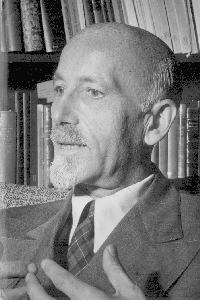
Paul Brunton helps us hear the melody behind the medley of today's "spiritual marketplace." His late writings raise the bar for what we can expect of spiritual teachings and teachers, and what we can do for ourselves. Born in London in 1898, he soon became a leading pioneer of much of what we now take for granted. He traveled widely throughout the world (long before it was fashionable) to meet living masters of various traditions with whom he then lived and studied. His eleven early books from 1934–1952 shared much of what he learned, and helped set the stage for dramatic east-west exchanges of the late 20th century. Paul Brunton left more than 10,000 pages of enormously helpful new work in notebooks he reserved for posthumous publication, much of which is now available as The Notebooks of Paul Brunton. See "The Complete Paul Brunton Opus" in blue below to see his many works available on this site. You can also search on Paul Brunton in the search bar to browse the selections, or click on a link below for specific connections.
Click here for an article about Paul Brunton.
Click here for The Notebooks of Paul Brunton.
To access small theme-based books compiled from Paul Brunton's writings, scroll down to Derived from the Notebooks below.
To access Paul Brunton's early writings, published from 1934–1952, scroll down to Paul Brunton's Early Works below.
To access commentaries on Paul Brunton and his work by his leading student, Anthony Damiani, as well as other writings about Paul Brunton and/or his work, scroll down to Commentaries and Reflections on Paul Brunton and His Work below.
Book Details
"Karma." A household word by now. But how many of us actually know what it means? Here is a refreshing, positive view of karma, from one of our most perceptive students of how timeless wisdom enhances modern living:
• What karma is
• How it works
• Its relation to forgiveness, freedom, and enlightenment
• How to get it working for you
More than 40,000 U.S. prison inmates have requested this book through a project operated by the Paul Brunton Philosophic Foundation. Many write moving letters of appreciation about how it is changing their whole take on how life works and what’s possible.
Introduction
1 What Karma Is
2 How Karma Works
Karma and inner evolution
Learning by doing
Freedom, fate, destiny
Freedom and environment
Group karma
Karma and foreknowledge
Timing, cycles, intensity
Individual accountability
3 Karma and Grace
The wonder of grace
Recognizing grace
Invoking grace
4 Working with Karma
Apply your understanding
Counter harmful tendencies
Accept, endure, overcome
5 Karma and the Great Liberation
Beyond personal karma
Selected excerpts from thank-you letters written by incarcerated men and women who have received this book:
“What is Karma was the most inspiring book I have read in a long, long time — it made me feel alive once again.” —prisoner, Avenal, CA
“What is Karma? . . . is one of the most insightful and on time books of my life. . . . I shall pass along the knowledge to others (believe this) and let them know of your very charitable organization.” —prisoner, AZ
"I have been told about What is Karma? by a friend I met here. . . He told me he was a lot like me. He was very angry, unforgiving, and just did not care. . . . He said he loves the book and he has been talking to a lot of men here . . . —prisoner, Sonyea, NY
"Recently, my girlfriend and I were introduced to a few passages from your book What is Karma? I can’t describe how the wisdom was so to the point. As young women addressing life's adversities, it’s a blessing to receive altruistic, knowledge, wisdom and direction.” —prisoner, Baltimore, MD
“When I first wrote to you I was seeking knowledge on how I could overcome my desire for using drugs. . . . I now see the problem I had from a different perspective, and because of this I now have a renewed faith in myself and humanity.” —prisoner, California Corr. Inst.
“Thank you very much for the books. . . . I have never read anything like them that has opened my mind, my heart and also my soul as much as they have. I wish that Mr. Brunton was still with us today so that I could thank him personally for all the insight. But he’ll live on forever within my mind now . . . —prisoner, Dinwiddie, VA
"I started smiling and have not stopped yet! My struggling mind was immediately quieted. . . . I thank you from my very core and I wish that you may feel the peace that your gift gave me. P.S. I will keep this book always as a guide and also as a reminder of how powerful karma truly is.” —prisoner, Fairfax, SC
". . . I’m hoping that you can please send me a copy of the karma book. A friend tells me he has changed his way of thinking because of this book and I would like to study whatever he was looking at.” —prisoner, Beeville, TX
“What is Karma? is very inspiring. Each day I read a saving proverb or thought for the day and believe me my brothers I receive great strength. I need that strength cause I’m here in Texas working on a small corner of their Plantation that they pride themselves on by treating other humans like dogs.” —prisoner, Rosharon, TX
"I received What is Karma? a couple of weeks ago and have read it through more than 7 times. I had to because it was very deep. I don‘t want to make this too long but I felt compelled to write you and extend my appreciation. Thank you very much.” —prisoner, Draper, UT
"Karma."
A household word by now. Often spoken with whimsy or heard with scorn in intelligent circles. Especially by energetic self-actualizers, who associate it with passivity or hear it as an excuse for laziness or fear of responsibility. Sometimes sighed in real or affected resignation to "God's will."
Imagine my surprise to learn that karma is, in fact, all about self-actualizing. About power and results. That to think of it as a power external to myself is to misunderstand it completely. That to explore how it works is to expand the scope and explore the limits of self-actualization.
Each of us has inner power and a measure of freedom, these teachings say. The consequences of how we choose to use — or choose not to use — that power echo through our lives. The echoes become increasingly complex as life goes on.
Similar choices made again and again become tendencies. Tendencies become habits. Habitual thoughts, habitual emotions, habitual actions take over, color and shape our whole version of the world. We may start thinking that the way things seem to be is the way they really are and have to be. When thinking that way becomes a habit, we can most benefit from understanding the natural law of karma.
The teachings on karma are not about dumbly resigning yourself to things as they seem to be. They're about reawakening to your own power to see more clearly and to act more profoundly and effectively. If I can master the force that creates and alters habits, they tell me, I align myself with the force that creates and transforms the world.
Understanding how karma works doesn't lead to simply enlightened selfishness. It involves much more than just getting savvy about how to become immune from harm and preserve or further your ego's self-interest. Most importantly, and most emphatically, it's not about hiding out — concealing what little you have so things don't get even worse.
Understanding karma takes us out of our inner isolation and beyond issues of pain avoidance and self-preservation. Not only is each of us self-actualizing in the sense of eventually reaping what we sow. The entire universe, we learn from the teachings about karma, is a self-actuating system; its continuous existence and continuous activity depends, like our own, on something infinitely greater than itself in which it is rooted. The entire system gains, loses, or stays the same through what each of its members does or neglects to do. Karma ultimately is our guarantee of meaningful participation in the life of the whole. For better or worse.
These teachings are only secondarily about consequences — only secondarily about why we reap what we do, why our lives have taken the shape they have. They're first about causes, about power, and about inspiring us to exercise our real freedom and sow what we would reap, to make ourselves into what we think the world needs more of: kindness for kindness, opportunity for opportunity, or whatever we would see more of in the world. They're less about "Vengeance is mine saith the lord" for your failures (though they are about that) than about "You learn and grow by doing" for your efforts.
Your ship will never come in if you don't send one out. To live in a better world, we each have to do our share in bringing it about. So these teachings are about willed actions long before the results of those actions. And before that, about the thoughts and emotions we dwell with that lead to those actions.
* * *
Paul Brunton (known to friends and students P.B.) is widely recognized as one of the twentieth century's most perceptive students of ancient wisdom. This little book presents, in condensed and concentrated form, what he learned about karma from a long and richly varied lifetime: from personal research, relentless trial and error, and intimate association with wise men and women from sacred traditions throughout the world. These pithy gems are drawn from a broad span of his writing, ranging from as early as the mid 1940s to shortly before his death in 1981. They concisely present the essence, and many of the details, of the teachings of karma as they appear throughout the world's wisdom traditions.
The esoteric interpretation of karma, he tells us for example, "recognizes that a wholly isolated individual is only a figment of our imagination, that each person's life is intertwined with all humanity's life through ever-expanding circles of local, national, continental, and finally planetary extent; that each thought is influenced by the world's predominant mental atmosphere; and that each action is unconsciously accomplished with the co-operation of the predominant and powerful suggestion given by humanity's general activity. This makes karma the resultant of all these mutual associations and consequently raises it from a personal to a collective level. That is to say 'I,' an individual, share in the karma generated by all other individuals, whilst they share in mine. . . . On this larger view karma makes us suffer for and rejoice with society as a whole. Hence we cannot divorce our own welfare from the social welfare. We must escape from inner isolation and join our interests to those of the All-Life. . . . The situation in which we all find ourselves today compels a recognition of this challenging truth in our mutual interest."
Teachings of karma are often developed in relation to teachings about freedom, predestination, grace, and reincarnation. P.B. told me personally in the spring of 1981 that there is no need for anyone to accept reincarnation in order to understand karma, and that what most people say about reincarnation is misleading anyway. I strongly suspect that had he put this little book together himself, he would have edited out most references to reincarnation, so as to present the teachings on karma in the sharpest possible light. I personally am not comfortable in modifying his writings in that way, however, so such references remain as they were written. But readers should bear in mind that P.B. repeatedly emphasized that karma normally actualizes as swiftly as possible.
Another important point: P.B.'s choice of words became increasingly more personal and precise as his understanding deepened through the years. He constantly sought better, clearer ways to say things, ways that break through conventional pat answers and make it easier for readers to get more core meaning with less effort. From early translations of the law of karma as "law of consequences," he moved on to terms such as "law of creative equivalence," "law of recompense," "law of self-responsibility," and so on. Eventually he realized that even the term "law of" could be misleading for people who take that word to imply that karma is a law we can honor or break, choose to obey or disobey. Be aware that, with only a few obvious exceptions, this variety of terms all refers to karma and not some other "law" or principle.
Similarly, his use of the word karma itself evolved throughout his writings. Some speak of karma as the momentum of past actions; others emphasize that it is more meaningful to see it as the power of present acts and intentions. Both are valid: Take the words in context of the particular excerpts in the text that follows.
One personal conversation with P.B. about freedom and predetermination is worth mentioning here, as the idea doesn't emerge as clearly as I would like under its own power in this book. It also brings out something of value about karma.
He said that people who stand for free will are partly right, and so are those who stand for predetermination. Each has something to hear from the other side. When you look at it carefully, he said, life is a highly ordered structure of opportunities. Some of those opportunities are material, some are spiritual. We have no control over the order in which they appear or the time at which they appear; but they are presented to a soul that is free at every moment to choose or refuse the opportunity. Each choice has consequences, and life never presents exactly the same opportunity again.
At any given time, we're living out the consequences of choices made earlier. In that sense, our lives are predetermined in the short run: things already set in motion must generally run their course. At a deep level, our whole version of the world — and what's possible in it — comes about through the filter of the tendencies we've developed and desires we've strengthened through our own repeated choices.
But we are also free to change the direction of our lives by the way we respond to the next opportunity; so in the long run free will has the day. I wish now that I had thought to ask P.B. what he meant by "short run" and "long run." Was he thinking short term like months or years, or maybe as this lifetime? But there I go again, missing the main point: as fast as possible.
A key element of these teachings is that the best way to appeal against, or to, the principle of karma isn't through prayer but through changing our thoughts. The more we alter the general trend of our thinking for the better, the better our outer life ultimately will become. The choices we make today alter or confirm the direction our life will ultimately go. Karma, far from imprisoning us, actually guarantees our freedom to determine much of what that will be.
That sounds fine when you feel strong, but how about when you don't? What about when you've dug a hole so deep it seems you'll never get out? When things are so bad it seems there's no turning them around? When the momentum of one bad or stupid action creates another and another in an endless and hopeless series? When despair would rob you or your loved ones of any chance for a fresh start or level playing field?
The news is good: the news about the relationship of karma and grace. Take a look at the note about Jesus and Buddha (page 84), and thumb through chapter three. You may want to read it a few times. It may seem too good to believe. Thank God (literally) it's not.
Finally, what about the very few for whom freedom means something of an entirely different order? The ones not content to think of freedom as a choice between this mansion or that hovel, this ego-centered joy or that ego-centered pain? Those weary of any kind of continued life in the separated ego and longing for the natural state of spirit: a richly textured serenity unruffled by the sorrows joys jubilations horrors or deadly bores of a given day? What does karma mean for them?
Remember the conversation mentioned earlier? "Some of the opportunities are material, some are spiritual." Choice remains, consequences differ. We learn that even the tendency to identify with the narrow interests of the personal ego is a habit reinforced or weakened by how freely we choose, or refuse, to do it. Chapters four and five give us an idea of what it's like to work at picking the options that free the spirit, exercising all the while the awesome freedom karma guarantees we will eventually use wisely.
—by Paul Cash, Editor, Larson Publications
It is absurd to treat the idea of karma as if it were some outlandish Oriental fancy. It is simply the law which makes each of us responsible for our own actions and which puts us into the position of having to accept the results which flow from them. We may call it the law of self-responsibility. The fact that it is allied with the theory of reincarnation does not invalidate it, for we may see it at work in our own present incarnation quite often.
* * *
The literal meaning of karma is "doing" and the applied meaning is simply that a person's karma is his or her own doing. We have made ourselves what we are now by our own actions — the term karma in its original reference includes mental actions. Karma is simply a power of the Universal Mind to effect adjustment, to restore equilibrium, and to bring about compensatory balance. In the sphere of human conduct the result is that somehow, somewhere and somewhen, whatever we do is ultimately reflected back to us. No deed is exhausted in the doing of it; eventually it will bear fruit which will return inexorably to the doer. Karma is a self-moving force. Nobody, human or superhuman, has to operate it.
* * *
This teaching does not turn us into lethargic fatalists as it does not permit us to swell into conceited individualists. It neither offers any excuse for a miserable weakness, nor bolsters up an illusory strength. It does inspire us with a balanced view of our possibilities, a sane view of our powers. The correct meaning of the word "karma" is willed action through body, speech, and mind. It does not include the results of this action, especially those which produce or influence rebirth. Such inclusion has come into popular concepts, but shows a loose use of the term. Karma is cause set going by the will, not effect at all. The phrase "Law of Recompense" is therefore not satisfactory and a better one is needed.
* * *
The law of recompense may possibly be better named the law of reflection. This is because every act is reflected back to its doer, every thought is reflected back to its source, as if by a vast cosmic mirror. Perhaps the idea of recompense carries too strong a moral implication and hence too limited a meaning to be the correct equivalent for the word "karma."
* * *
Karma has a twofold character. There is the kind which nothing that human wit may devise can alter, and there is also the kind which we may alter by counter-thoughts and counter-actions, or by repentance and prayer. Evil karma cannot be extinguished without moral repentance, although it may be modified by astuteness.
* * *
There is no supernatural and external being who arbitrarily administers or controls karmic rewards or punishments. We unconsciously produce their seeds ourselves; when a favorable hour comes, they germinate and yield their own fruit.
* * *
It is not that some mysterious superphysical angel, deva, or god intervenes personally and manipulates karma as a puppet performer pulls the wires of his suspended figures, but that karma is part of the equilibrium of the universe, bringing a come-back, recording a pressure, allowing each reaction to come about by its own momentum.
* * *
The working of karma traces complicated effects back to complicated causes.
* * *
If in the end — and sometimes well before — karma catches up with you, it is not all painful; the term need not fill you with foreboding. For the good you have thought and done brings a good come-back too.
* * *
No human existence is without its troubles at some period or without its frictions at another. The first arises out of the element of destiny which surrounds human freedom, the second out of the element of egoism which surrounds human relations.
* * *
Life is not trying to make people either happy or unhappy. It is trying to make them understand. Their happiness or unhappiness come as by-products of their success or failure in understanding.
* * *
If unerring karma were the only power behind fortunes and misfortunes, it would be a sorry outlook for most of us. We have neither the knowledge, the strength, nor the virtue to accumulate much good merit. On the contrary, we have all the ignorance, the weakness, and the sinfulness to accumulate plenty of demerit. But such is the beneficence behind the universe that we are not left to the treatment of karma alone. Alongside it there exists another power, the power of grace. The two operate together, although nobody can predict how much or how little of one or the other will manifest itself in any particular case.
* * *
The view that karma operates like an automatic machine is not a wholly true one; this is because it is not a wholly complete one. The missing element is grace.
* * *
The rejection of the idea of Grace is based on a misconception of what it is, and especially on the belief that it is an arbitrary capricious gift derived from favoritism. It is, of course, nothing of the kind, but rather the coming into play of a higher law. Grace is simply the transforming power of the Overself which is ever-present but which is ordinarily and lawfully unable to act in a person until he or she clears away the obstacles to this activity. If its appearance is considered unpredictable, that is because the karmic evil tendencies which hinder this appearance vary considerably from one person to another in strength, volume, and length of life. When the karma which generated them becomes weak enough, they can no longer impede its action.
* * *
The Overself acts through inexorable law, yes, but love is part of the law. Grace violates no principle but rather fulfills the highest principle.
* * *
Some have difficulty in understanding the exact place in the scheme of things of Grace. If they believe in the law of recompense, there seems to be no room left for the law of Grace. It is true that we must amend our conduct and correct our faults; that no escape from these necessary duties can be found. But they can be done alone or they can be done with the thought, remembrance, and help of the Overself. This second course introduces the possibility of Grace. It can enter only if the first has been followed and only if the aspiration has succeeded in lifting the consciousness to the Overself. A moment's contact will suffice for this purpose. What happens then is that the inner change is then completed and the remaining, unfulfilled karmic consequence is then annulled. There is no giving of "something for nothing" here, no breakdown of the law of recompense. The ego must use its will to repent and amend itself, in any case.
* * *
Buddha found himself in a land where degenerate priestcraft had cunningly persuaded the masses to believe that every sin could be expiated, and its present or future effects in destiny circumvented, by some paid-for ritual, sacrifice, or magic. He tried to raise the moral level of his people by denying the pardon of sin and affirming the rigorous governance of karmic law, the strict unalterability of unseen justice. Jesus, on the contrary, found himself in a land where religion proclaimed harshly, "An eye for an eye, a tooth for a tooth." He too tried to raise the moral level of his people. But a wisdom not less than Buddha's made him meet the situation by stressing forgiveness of sins and the mercy of God. "The law of recompense brings every man his due and no external religious form can change its working" is, in effect, the gist of much Buddhist teaching. "True," Jesus might have said, "but there is also the law of love, God's love, for those who have the faith to invoke it and the will to obey it." Let us grant that both the prophets were right if we consider the different groups they were addressing, and that both gave the kind of help that was most needed by each group. Let no one deny to divinity a virtue which is possessed by humanity. The higher self's response to the ego's penitence is certain. And such response may stretch all the way to complete forgiveness of sins.
* * *
It is not a matter for regret when you have to face adverse circumstances, but rather a challenge as to what you can make of them. They represent a triple possibility: deterioration, stagnation, or growth. When your mind has been accustomed sufficiently long to these ideas, and when they have been recreated as the product of your own thinking and the conclusion of your own experience, they will enable you to meet the challenges of destiny and the mutations of fortune with a strength and wisdom unknown before.
* * *
The unpaid mistakes and debts from former lives are now here to haunt us. If we want release from them, we must either get release from our egos or else set up counteracting thoughts and deeds of an opposite character and in overwhelming amount.
* * *
The privileges of enlightenment can only be justified on the basis of karma — "My own, my own, shall come to me," as the poet intuited.
* * *
Just as we have to look at the world in the twofold way of its immediate and ultimate understanding, so we have to find enlightenment in a twofold way through our own self-creative efforts and through the reception of Grace.
* * *
No one is excluded from that first touch of Grace which puts them upon the Quest. All may receive it and, in the end, all do. But we see everywhere around us the abundant evidence that a person will not be ready for it until he or she has had enough experience of the world, enough frustration and disappointment to make them pause and to make them humbler.
* * *
When your efforts have brought you to a certain point, then only do they get pushed aside or slowly drawn away by another power — your higher Self. What really happens is that the energy or power which you are using spontaneously ignites. It is that which enables you to do, to get done, to achieve. The all-important point is that the active power is not your own will, but is really a direct visitation of what we must call Grace. It is strongly felt, this experience of the higher power or higher Self.
To see all our Paul Brunton titles, scroll down to The Complete Paul Brunton Opus below.
About Paul Brunton

Paul Brunton helps us hear the melody behind the medley of today's "spiritual marketplace." His late writings raise the bar for what we can expect of spiritual teachings and teachers, and what we can do for ourselves. Born in London in 1898, he soon became a leading pioneer of much of what we now take for granted. He traveled widely throughout the world (long before it was fashionable) to meet living masters of various traditions with whom he then lived and studied. His eleven early books from 1934–1952 shared much of what he learned, and helped set the stage for dramatic east-west exchanges of the late 20th century. Paul Brunton left more than 10,000 pages of enormously helpful new work in notebooks he reserved for posthumous publication, much of which is now available as The Notebooks of Paul Brunton. See "The Complete Paul Brunton Opus" in blue below to see his many works available on this site. You can also search on Paul Brunton in the search bar to browse the selections, or click on a link below for specific connections.
Click here for an article about Paul Brunton.
Click here for The Notebooks of Paul Brunton.
To access small theme-based books compiled from Paul Brunton's writings, scroll down to Derived from the Notebooks below.
To access Paul Brunton's early writings, published from 1934–1952, scroll down to Paul Brunton's Early Works below.
To access commentaries on Paul Brunton and his work by his leading student, Anthony Damiani, as well as other writings about Paul Brunton and/or his work, scroll down to Commentaries and Reflections on Paul Brunton and His Work below.
The Complete Paul Brunton Opus:
Paul Brunton's most mature work, in the order he specified for posthumous publication.
Smaller books on popular/timely themes, developed from the Notebooks and published posthumously.
Paul Brunton's works published during his lifetime from 1934-1952
Commentaries/Reflections by other authors on Paul Brunton or his works.

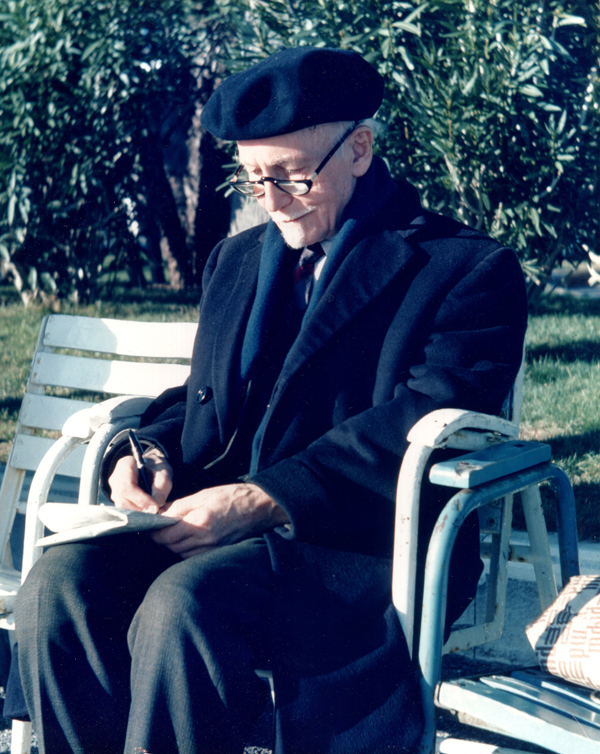

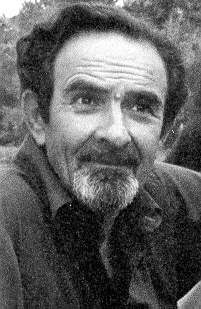



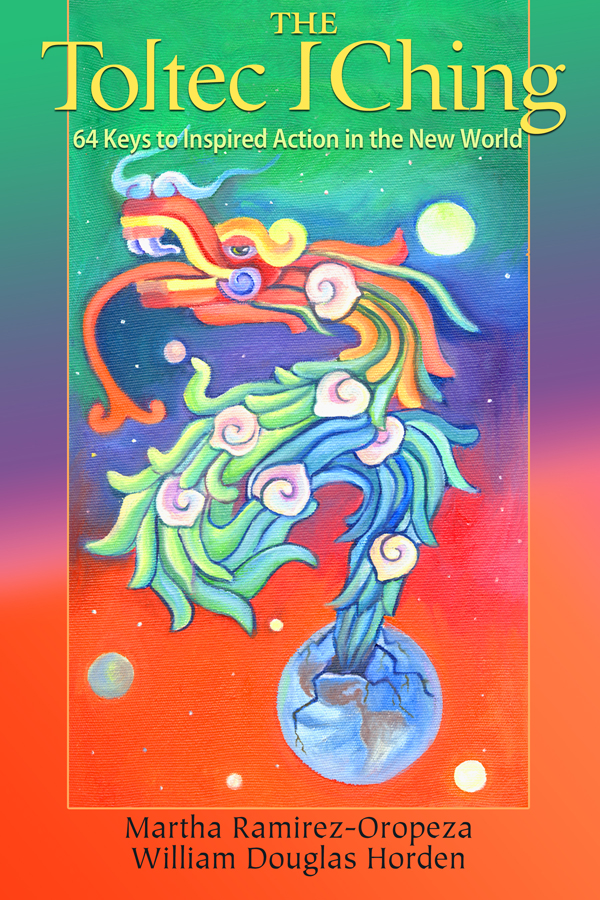
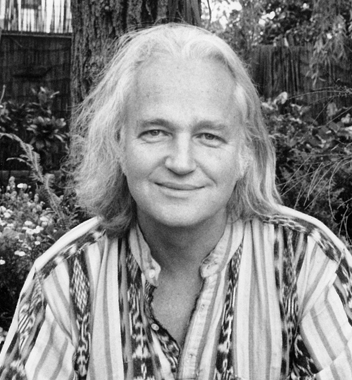
.jpg)
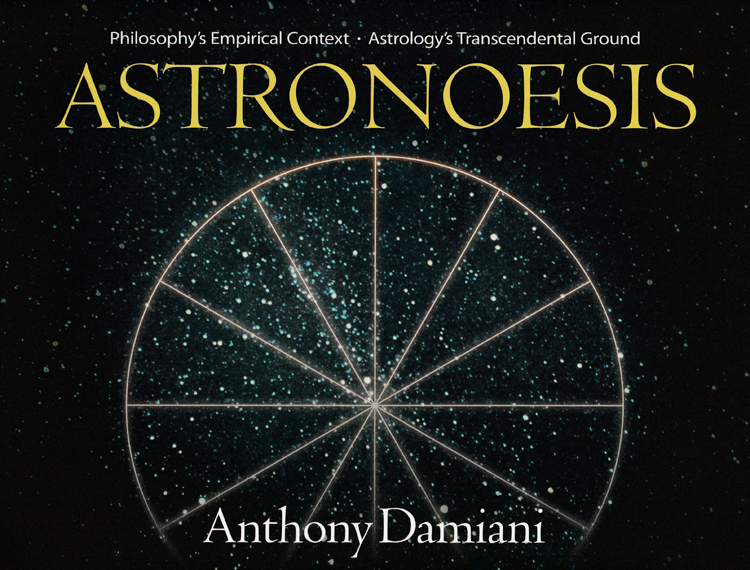
.jpg)
.jpg)
.jpg)
.jpg)
.jpg)
.jpg)
.jpg)
.jpg)
.jpg)
.jpg)
